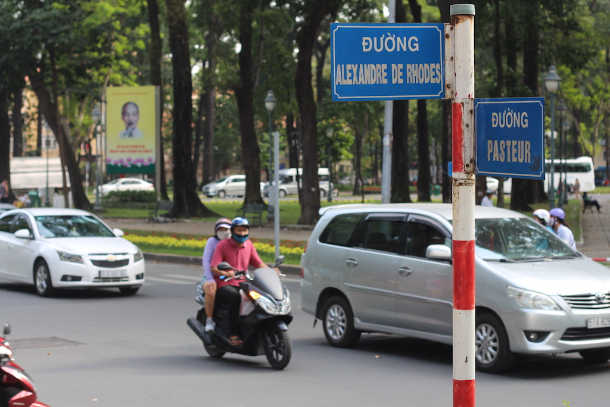
A street named after French Jesuit missionary Father Alexandre de Rhodes in Ho Chi Minh City. (ucanews photo)
Intellectuals in Vietnam are having a heated debate about a city’s plan to name streets after two 17th century Jesuit missionaries credited with systematizing the country’s official language.
Since October, authorities in Da Nang have collected public opinions about a plan to name 137 streets in the southern central city by the end of this year. Two streets in Hai Chau district are due to be named after Fathers Francisco de Pina (1585-1625) and Alexandre de Rhodes (1591-1660).
Portuguese Father de Pina, a pioneer in learning and researching Vietnamese after he arrived in southern Vietnam in 1617, used the native language to teach catechism to local people and taught it to other Jesuits. He also wrote a catechism book in quoc ngu, the romanized Vietnamese writing system, and composed a grammar book. He drowned in Hoi An on Dec. 15, 1625.
French Father Rhodes, who arrived in Vietnam in 1625 and studied Vietnamese with Father de Pina, gathered quoc ngu works by other authors and published three books in Rome in 1651: a Vietnamese-Portuguese-Latin dictionary, a Vietnamese grammar book and a catechism book.
His works marked the first time a Latin-alphabet Vietnamese writing system was presented in a categorized way. He was expelled from Vietnam in 1645.
Da Nang officials said the two missionaries played significant roles in the formation of the present Vietnamese script. "The founding of the modern Vietnamese romanized script has boosted Vietnamese culture incredibly. Their names were suggested by historians and cultural researchers,” the city’s department of culture and sports said.
In late October, 12 historians, professors and researchers petitioned Da Nang authorities not to name schools and streets after the Jesuits.
They said Father Rhodes did not create quoc ngu and accused him of using it for evangelization, condemning the religions of Confucianism, Taoism and Buddhism, and hatching a plot to lead French troops to invade Vietnam.
Prof. Hoang Dung from the Pedagogical University in Ho Chi Minh City said most researchers agreed that quoc ngu was not a product of Father Rhodes, who amassed works from other people, but they appreciated his contributions to the national language’s development, especially his trilingual dictionary.
Many intellectuals who supported the street-naming plan said the 12 petitioners misunderstood the meaning of the word “soldats” (soldiers) in Father Rhodes’ work Divers Voyages et Missions published in 1653. The French missionary asked King Louis XIV to provide him with several soldiers (missionaries) to conquer the Orient and to subjugate it to Jesus Christ.
They also said the petitioners made groundless allegations that Father Rhodes was involved in the French invasion of Vietnam. He worked in Vietnam from 1625 to 1645 but French troops invaded the country in 1858.
They said foreign missionaries and local Catholics made great contributions to taking Vietnam to the world and appreciating Western cultural values.
They called on Da Nang authorities to name streets after the priests to express the nation’s gratitude to foreign missionaries who contributed to the creation of quoc ngu.
On Nov. 30, Van Lang University in Ho Chi Minh City held a symposium to mark the 100th anniversary of quoc ngu being officially used in schools. Speakers praised Jesuit missionaries and Vietnamese Catholics for creating the language.
Da Nang authorities plan to hold a symposium on the development of quoc ngu this month.
There are three streets named after Father Rhodes in Ho Chi Minh City, Vietnam’s largest city. One is close to Notre Dame Cathedral.


